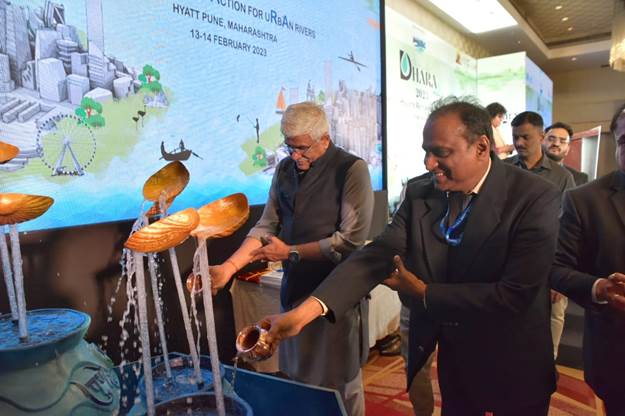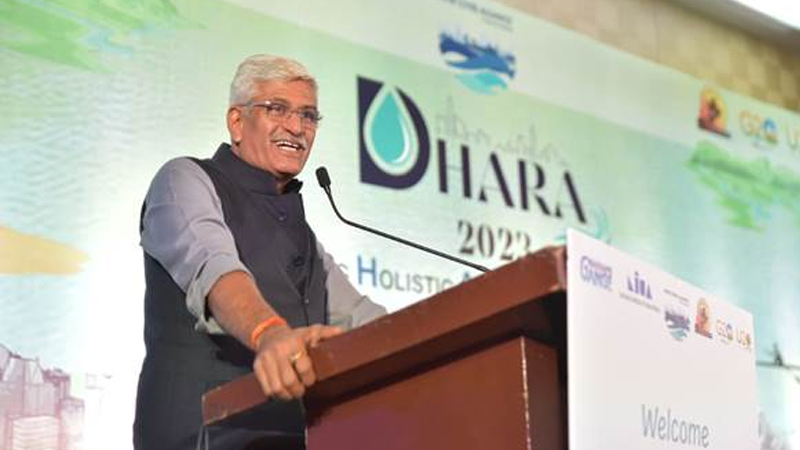The Union Minister for Jal Shakti, Shri Gajendra Singh Shekhawat presided over the opening session of DHARA 2023 (Driving Holistic Action for Urban Rivers) organised by National Mission for Clean Ganga (NMCG) and National Institute of Urban Affairs (NIUA) in Pune today. DHARA is the annual meeting of the members of the River Cities Alliance (RCA) and provides a platform for senior officials including Commissioners, Addl. Commissioners, Chief Engineers and Senior Planners of over 100 member-cities in India to co-learn and discuss solutions for managing local water resources.
Shri G. Asok Kumar, Director General, NMCG, Shri Vikram Kumar, Municipal Commissioner, Pune, Shri Hitesh Vaidya, Director, NIUA were also present on the occasion. The opening session also witnessed the launch of Urban River Management Plan for Ayodhya and Aurangabad and ‘75 River Initiatives’ – a Compendium. The Union Minister inaugurated the event by unifying the water collected from 52 participating cities in a Jal Kalash.
Addressing the gathering, Shri Gajendra Singh Shekhawat said that rivers are synonymous with civilizations and after several decades of using our rivers for survival, we must reflect on what we have given the rivers back, otherwise our future generation will bear the brunt of water scarcity. He expressed his happiness on the fact that over 40 Municipal Commissioners are present today at the event and reflected on the importance of de-centralized planning in effectively managing water resources. “The planning can best be done at the level of the local self-bodies and that is the reason why their presence here is of immense importance,” adding, “Through the local bodies we can directly connect with the people, which is absolutely essential for the success of any programme concerning water.”
Shri Shekhawat said that the country is going through a crucial time and has completed the 75 years of independence. He also said that technologically-driven change that has been witnessed in the past few decades make it all the more important for all of us to collectively work in the direction of making a ‘Viksit Bharat’ as envisioned by our Hon’ble Prime Minister. “The world is looking at us because of our growth, especially since India has been handed over the G20 presidency,” he said, adding, “During an event in Bhopal – Vision@2047- it was emphasized by me that we have accepted the challenge of Viksit Bharat and it is our collective responsibility. I was happy to see that 25 states participated in that event and made presentations on their plans for water related issues.” He added that water availability is the basis of making Vision@2027 target a success and it is our firm belief that requirement of water is directly proportional to the growth of the economy.
He also said that caution has to be exercised in ensuring that our programmes on rivers do not get limited to infrastructure development but we must try and establish a robust people-river connect. “It is necessary to reestablish the respect for water, which went down from generation-to-generation as part of the traditional wisdom of our forefathers,” he said, adding, “It is time that we generate that sentiment in the younger generation by using social media, which is a powerful tool in the times we live.”
He added that the Ministry of Jal Shakti is working holistically for providing safe drinking water to every household, groundwater management and recharge, aquifer mapping, river rejuvenation and India is among the countries with one of the biggest financial allocation to the water sector. “We have to move ahead with a firm resolution and we will certainly achieve our targets,” he said.
He expressed his happiness over the trajectory of increasing members of River-Cities Alliance from 23 to 107. Shri Gajendra Singh Shekhawat said that under the leadership of the Hon’ble Prime Minister, water as a sector is raising above the silos. “If every city (107) which is the member of the RCA will take a step forward, we will take 107 steps forward and that is the need-of-the-hour,” he added.
Delivering the opening address, Shri G. Asok Kumar, DG, NMCG welcomed the guests and said that Namami Gange Programme was launched to rejuvenate River Ganga and its tributaries. He said that water was hardly a priority for municipal commissioners but under Namami Gange Programme, they were urged to bring water into their main agenda and we have been successful in doing that. “Namami Gange has been selected as one of the world’s top 10 flagship programmes from over 160 countries which is a testament of the success of Namami Gange Programme.”
Talking about the 2nd National Ganga Council meeting that took place on 30th December 2022, Shri Kumar said that the Hon’ble Prime Minister mentioned during the meeting how rivers are extremely important vehicles for economic growth and emphasized the direct connection between clean rivers and the country’s GDP and growth. “The Hon’ble PM espoused the concept of Arth Ganga in the first NGC meeting to focus on improving the lives of the people living on the banks of the river basins. The contribution of the Hon’ble Prime Minister in bringing back the respect for water is unparalleled,” Shri Kumar added. Shri said the vision for Swachh Bharat Mission laid out by Hon’ble PM Narendra Modi paved the path towards a paradigm shift in the approach to urban management which can be seen in several improved health indicators.
Shi Kumar expressed his happiness on the fact that the members of the River Cities Alliance have crossed the 100 mark and the urban water issues are now being address in totality. “Water has always been kept in silos; one H2O was divided into multiple units. The creation of the Jal Shakti Ministry in 2019 was, perhaps, the first attempt at breaking those silos,” he said, adding, “Another important factor is the encroachment of our water bodies, which are the backbone of the traditional wisdom of water conservation and rainwater harvesting.”
Shri Kumar urged the municipal commissioners to manage their water resources well to see tremendous growth in health, economy and overall well-being in their jurisdictions and add value to their cities. “NMCG has taken a lot of initiatives like making Urban River Management Plans, Thesis Competition etc. to develop models for water as a development resource and RCA is certainly one of the most important steps in the direction of effective urban water management,” he said, adding, “Water sector is a niche area and good work done will pave the way towards an efficient water management and make India water secure.” He ended his address by expressing hope that the unique ideas and solutions presented in the deliberations will be used by the city planners with DHARA becoming rain stream that can help make India a river-friendly country.
Day 1 of DHARA 2023 saw sessions on ‘Innovative Examples of River Management within India’, ‘Innovative International Case Studies for River Management’, ‘Strengthening the Agenda for Urban River management’, ‘Youth for Rivers’, ‘Experiences from International River Cities’.
Mr. Himansu Badoni, Executive Director, NMCG; Mr. S. Vishwanath, Director, BIOME Solutions; Mr. Ramveer Tanwar, Pondman of India; Dr. Kartiki Naik, Urban Development Specialist, World Resources Institute; Mr. Gaurav Anand, Swacchta Pukare, Jamshedpur; Mr. Rajiv Ranjan Mishra, Chief Advisor, NIUA; Col. Andy Pannier, Secretary, Mississippi River Commission, USA; Ms. Martina Bukard, Programme Director, GIZ, Germany; Dr. Harry Virahsawmy, Head of Urban Water, Alluvium Consulting, Australia; Dr. Anitha Sharma, Counsellar for Water and Urban Development, Embassy of Denmark; Dr. Srinivas Chokkakula, Ministry of Jal Shakti Professional Chair, Centre for Policy Research; Prof. Mr. Vinod Tare, Founding Head, cGanga and Mr. Dheeraj Joshi, Deputy Secretary, NMCG were among the panelists of the sessions on Day 1.



